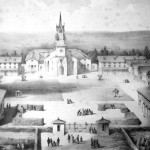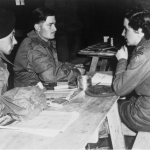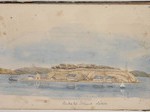
Ecuadorian thoughts on religion, power and the subaltern classes
The Iglesia de la Merced, in Quito, was built in 1737 on the remains of the original church that dated from 1538 – four years after the foundation of the city. The church is situated in the city centre, at less than one kilometre distance from all other main sites of the colonial period: the […]

The case for ‘remain’ in the EU referendum – my view as the director of a €1.5 million European funded research project in History
At the end of last week, thirteen Nobel prize-winning scientists wrote a letter to the right leaning newspaper The Daily Telegraph, urging Britain to vote ‘remain’ in the forthcoming European Union (EU) referendum. The scientists warned of the consequences of a British exit (or ‘Brexit’) from the EU, drawing attention to the fact that […]

Conceptualising Islands in History: Considering Bermuda and Gibraltar’s Prison Hulks
By Anna McKay, AHRC Collaborative Doctoral Partnership Student, National Maritime Museum & University of Leicester. As a relatively new addition to the University of Leicester’s School of History and the Carceral Archipelago project, over the last few months I feel as if I’ve undergone a thorough “academic baptism”. Since beginning my PhD studies in […]

Thinking sociologically about the history of convicts and penal colonies
In the early 1990s I had the privilege of studying with David Garland, then teaching and researching in Edinburgh University’s Law School. He had recently published a wonderful book – Punishment and Modern Society: a study in social theory – which remains as relevant and important today as it was then. Week by week, Professor […]

Convicts and other (“free” and “unfree”) workers. Views from the First ELHN Conference
How can we frame convict labour in the broader context of entangled labour relations? This is one of the key-questions in the Carceral Archipelago project, which seeks to understand how (especially transported) convicts interacted with other workers within and across empires. Some important suggestions for addressing this question emerged during the first European Labour History […]

Life-Writing, Prisoners of War and the Carceral Archipelago
by Grace Huxford Lecturer in Nineteenth/Twentieth Century History, University of Bristol At the Carceral Archipelago conference held in September at the University of Leicester, I delivered a paper on British prisoners of war during the Korean, on a panel regarding ‘Political Prisoners’. Chaired by Professor Mary Gibson (CUNY), with Aaron Moore (Leicester) and Natasha Pairaudeau […]

Indigenous Geographies of Carceral Islands
Aboriginal and Torres Strait Islander readers are advised that this post contains images of people who have died. At the Carceral Archipelago’s conference last month we discussed how landscapes around penal institutions could be rendered “empty” in our histories. This conception emerges from archival records in which land and sea are portrayed as “natural […]

The Carceral Archipelago Conference, Leicester 13-16 September 2015
The Carceral Archipelago conference, held in Leicester from 13 to 16 September 2015, felt just like reading over thirty outstanding monographs in two-and-a-half days, getting to know their authors personally, and having the chance to reflect collectively about their mutual entanglements. It was an intense marathon through the burgeoning field of the global history of […]

Arch Street Prison: A Prison without Convicts
By Kristin O’Brassill-Kulfan. Over the past two years, I’ve been welcomed as an affiliated researcher by the CArchipelago team with the tangible benefit of having learned more about both convict history and global history in this brief span of time than in a lifetime previous. My own work is less internationally defined than the avenues the […]

Convicts, Collecting and Knowledge Production in the Nineteenth Century
In previous blogs, I have explored some of the circulations and connections that linked nations, colonies and empires, and wove together practices of punishment and penal labour across polities and imperial spaces. This included the sharing of official reports, the spread and adaptation of particular modes of convict punishment, and the intra-colonial mobility of personnel […]

Recent Comments